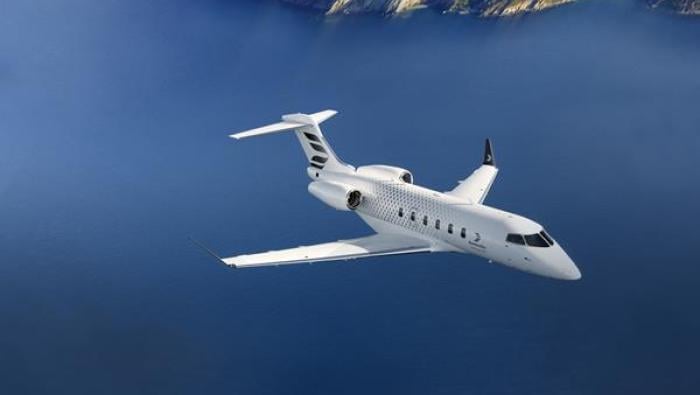
Bombardier increased its foothold in Central America with the delivery of the first Challenger 3500 in Costa Rica. The company has had an established base in Costa Rica since 2015, employing more than 100 people in support of finance and billing.
But the delivery last week to an unnamed customer marks a milestone for the super-midsize jet, underscoring its ability to connect Costa Rica to key business and leisure hubs, the Montreal-headquartered airframer said. With a 3,400-nm range, the aircraft can link San José with destinations such as Los Angeles, New York, Santiago, and Buenos Aires.
“With its high reliability, modern cabin, and exceptional runway performance, the Challenger 3500 has quickly established itself as the aircraft of choice for customers around the world as well as in Central America,” said Michael Anckner, sales v-p of worldwide preowned, fleet, defense, and Latin America. “This delivery marks an important growth milestone for our fleet in Central America and clearly demonstrates the trust that clients in the region have in Bombardier.”
|
Aircraft and aviation parts will be exempt from tariffs under the U.S.-European Union trade agreement announced yesterday by President Donald Trump and European Commission President Ursula Von der Leyen. From August 1, most other EU imports to the U.S. will be subject to a 15% tariff, but a 50% tariff will be charged on aluminum and steel.
NBAA and GAMA welcomed the “zero-for-zero” agreement for the aerospace sector. The exemption mirrors the terms previously agreed in a trade deal between the U.S. and the UK late last month. In the run-up to President Trump’s August 1 deadline for reaching a deal, the EU had faced 30% tariffs. Sunday’s agreement with the EU ends the 10% tariff on aircraft and aviation parts imposed by the U.S. earlier this year.
“We commend the Trump Administration and EU Commission officials for working together to support the civil aerospace supply chain and foster the health and growth of the aerospace industry,” commented GAMA president and CEO James Viola. “The global success of the general aviation manufacturing industry drives innovation, enhances safety, and strengthens economic opportunity.”
However, trade analysts have warned that the terms of the framework trade deal are not binding, with a Trump Administration official briefing reporters on Sunday that President Trump can increase tariffs on the EU at any point in the future.
|
Aviation technologist Skyryse is aligning its Skyryse One production helicopter with performance standards under the newly finalized Modernization of Special Airworthiness Certification (Mosaic) rule as it progresses on development of its SkyOS operating system that automates key aircraft functions. The company lauded the release of the Mosaic rule on Tuesday at EAA AirVenture as “a pivotal moment in the evolution of aviation,” fostering new technologies in light aircraft.
Skyryse said Mosaic shifts rules from rigid requirements to performance-based standards, facilitating opportunities for safer and more capable technologies. In particular, the company praised the rule for outlining how aircraft, helicopters, and future vertical lift aircraft equipped with systems such as its SkyOS may only require 20 hours of pilot training. A “simplified vehicle operation” (SVO), SkyOS replaces conventional, complex mechanical flight controls with an intelligent, integrated fly-by-wire flight control and operating system.
“By decreasing the traditional training requirements by 50% when SVO is in use, the rule acknowledges the impact simplified controls have in reducing the complexity and increasing the safety of piloting,” Skyryse said, adding that this also lowers the barrier of entry into aviation.
Skyryse has achieved several milestones with its Skyryse One production helicopter—a converted turbine Robinson R66 with SkyOS—demonstrating the technology, including the first automated autorotation. The company is testing for FAA credit as it works to meet the new standards.
|
An FAA notice of proposed rulemaking (NPRM) to restrict public access to aircraft owner information based on the 2024 FAA Reauthorization Act has inspired both laudatory and concerned reactions across the aviation ecosystem, with airport officials, transaction attorneys, and industry associations warning of potential operational, financial, and legal consequences. The NPRM drew more than 300 comments.
According to title company representatives, complete privacy limitations could lead to problems with aircraft titling and sales. “Making sure that people cannot track flights is not a bad goal. There are security reasons, there are safety, maybe even confidentiality reasons,” acknowledged AIC Title Service general counsel Bruce Marshall. “But the problem is…the FAA was co-mingling operational information, ADS-B information, and ownership information. The registry originated so that you could follow the legal documents and have some way of determining ownership and interests in aircraft.”
Aircraft financiers and attorneys worry the changes would upend due diligence and open the door to fraud. “It would be like buying a house and not checking the title,” said Clay Healey of AIC Title. “We can’t do our jobs for people,” warning that removing ownership data “crushes the business.”
The American Association of Airport Executives urged the agency to develop a secure-access portal for credentialed airport users, noting that the statutory authority for privacy applies to “individuals,” not corporate entities.
|
Sponsor Content: Gogo Business Aviation
Gogo Galileo HDX revolutionizes business aviation connectivity with global, high-speed broadband powered by Eutelsat OneWeb’s LEO constellation. Offering seamless, low-latency internet—even over polar routes—this compact antenna enhances passenger experience and operational efficiency, delivering always-on, multi-orbit, multi-band connectivity for jets worldwide.
|
Titan Aviation Fuels subsidiary Titan Aerospace Insurance (TAI) has secured a partnership with a major insurance provider to offer a general liability insurance program specifically for Titan-branded FBOs. According to TAI, the program will combine experience in aviation and insurance to provide customers with significant value, including cost savings and operational advantages.
Included among the benefits are profit sharing for participants based on safe operations resulting in low-loss claims, insurance provider-funded safety initiatives, property coverage for ground support equipment, limited pollution coverage, and additional custom benefits tailored to branded FBO operations.
Earlier this year, the company announced a similar partnership on a workers’ compensation plan for its members.
“We understand the unique risks our branded FBOs face and are proud to offer a program that not only protects their operations but also rewards their commitment to safety,” said TAI CEO Jon Downey. “This general liability program, in conjunction with our workers’ compensation partnership, provides a truly unique solution for Titan-branded FBOs.”
|
Polaris Aero has integrated artificial intelligence capabilities into its Vocus Safety Intelligence software, expanding the aviation safety platform with tools aimed at improving reporting accuracy, searchability, and cross-department collaboration. The latest updates to Vocus SMS include AI-assisted content search, automated policy and report generation, and smarter risk classification. According to Polaris, the enhancements help users save time while ensuring safety-critical information is easier to access and analyze.
Key features include fast organization-wide search, guidance for documenting mission impact like delays or cancellations, and automated support for lessons-learned sharing. Chris Connor, Polaris Aero co-founder and CEO, said, “These new AI-powered tools are designed to save users time, reduce friction, and help teams focus on what really matters—making smarter, safer decisions before issues turn into incidents.”
Robert Myrick, aviation safety and governance manager at Entergy and a long-time Vocus customer, said the new tools improve both speed and usability. “The AI tools are intuitive and effective,” he said. “They bring efficiency and speed to an already streamlined safety management system, saving us time on both data entry and retrieval of information.”
Polaris said the new capabilities also support broader safety management efforts across uncrewed aircraft system operators, FBOs, and MRO facilities. Additional updates are planned for its other platforms: FlightRisk and GroundRisk.
|
Elevate MRO has added capabilities to include the installation of Gogo Business Aviation in-flight connectivity systems at its locations, either directly or offsite at client facilities through strategic collaborations.
The MRO provider has partnered with certified Gogo installation providers to expand its service offerings to products including Gogo Avance L3, L5, or the upcoming Gogo 5G system. Elevate MRO’s team coordinates the entire process, overseeing scheduling, certification, and post-installation support.
These added capabilities come as demand for high-speed in-flight Wi-Fi continues to grow, the company added. “Connectivity is no longer a luxury—it’s a necessity,” said Elevate MRO president Jim Slack. “Our clients can now enjoy seamless access to Gogo installations right here in the Denver metro area, as well as in the Salt Lake City region.”
Part of the Elevate Aviation Group, Elevate MRO is an FAA-certified Part 145 maintenance provider with facilities at Rocky Mountain Metropolitan Airport (KBJC) in Broomfield, Colorado, and Salt Lake City International Airport (KSLC).
|
China’s Skyco International Leasing has placed an order for six Airbus H175 helicopters to be used for offshore industry support flights. The contract is a follow-up to the six-unit H175 order the company placed in early 2024 for emergency management and public service applications in Guangdong province.
The latest batch of H175s joining the Skyco portfolio will be leased and operated by helicopter group China Southern Airlines General Aviation (CSAGA) for energy industry contracts. CSAGA has been using U.S.-made Sikorsky S-92A rotorcraft for offshore operations, which is a sector increasingly being targeted by Europe-based Airbus with its super-medium twin H175.
Guangzhou-based Skyco is a public-private joint venture between the Guangdong Airport Authority and various local and international investors. CSAGA, the helicopter division of China Southern Airlines, is also assessing EHang’s EH216-S autonomous eVTOL for a variety of applications.
To date, Airbus has delivered 71 H175s, and the aircraft already in service have logged 250,000 flight hours since the model entered service in 2014.
AVIATION SAFETY QUESTION OF THE WEEK
The following acronyms may be presented in an IFR en route chart: MEA, MRA, MAA. What do they stand for?
- A. Minimum Enroute Altitude, Minimum Reception Altitude, and Maximum Authorized altitude, respectively.
- B. Minimum Enroute Altitude, Maximum Reception Altitude, and Minimum Authorized altitude, respectively.
- C. Maximum Endurance Altitude, Maximum Range Altitude, and Maximum Autonomy altitude, respectively.
- D. None of the above.
|
|
Attention Aviation International News subscribers: To ensure uninterrupted service please take a moment to renew your subscription today. If you are not a subscriber but would like to sign up, you can do so here. AIN is a monthly print and digital publication that provides in-depth features and news that cover the global business aviation industry, including aircraft manufacturing, operations, services, maintenance, technology, and the people who drive business aviation’s success.
|
RECENT ACCIDENT/INCIDENT REPORTS
July 28, 2025
Over Lake Lucerne near Kehrsiten, Switzerland |
- REPORT TYPE: Preliminary
- INCIDENT TYPE: Nonfatal
- ACCIDENT REGISTRATION #: D-FSAM
- MAKE/MODEL: Daher TBM 940
July 26, 2025
Homer, Alaska United States |
- REPORT TYPE: Preliminary
- INCIDENT TYPE: Incident
- ACCIDENT REGISTRATION #: N808VS
- MAKE/MODEL: Robinson R66
July 24, 2025
Nome, Alaska United States |
- REPORT TYPE: Preliminary
- INCIDENT TYPE: Incident
- ACCIDENT REGISTRATION #: N363JH
- MAKE/MODEL: Beechcraft King Air B200
July 23, 2025
Thibodaux, Louisiana United States |
- REPORT TYPE: Preliminary
- INCIDENT TYPE: Fatal Accident
- ACCIDENT REGISTRATION #: N2611
- MAKE/MODEL: Bell 206L1
July 21, 2025
Oelwein, Iowa United States |
- REPORT TYPE: Preliminary
- INCIDENT TYPE: Nonfatal
- ACCIDENT REGISTRATION #: N88911
- MAKE/MODEL: Robinson R66
|
 |
|
AINalerts News Tips/Feedback:
News tips may be sent anonymously, but feedback must
include name and contact info (we will withhold name on request). We reserve the
right to edit correspondence for length, clarity, and grammar. Send feedback or
news tips to AINalerts editor Chad Trautvetter.
|
AINalerts is a publication of AIN Media Group, 214 Franklin Avenue, Midland Park, New Jersey. Copyright 2025. All rights reserved.
Reproduction in whole or in part without permission is strictly prohibited.
|
|

















